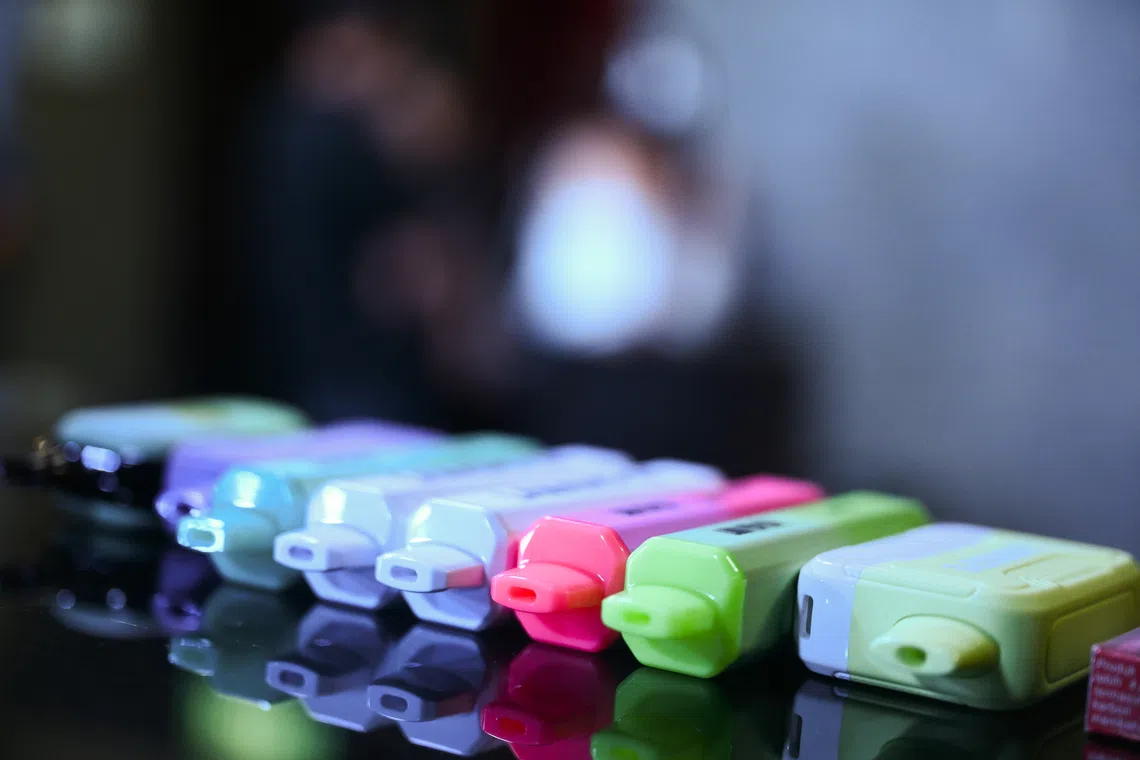Over 10,000 officers tackling vaping crisis in S’pore; nearly 10,000 cases in first 8 months of 2025
Sign up now: Get ST's newsletters delivered to your inbox

Health Sciences Authority has detected nearly 10,000 vaping cases within the first eight months of 2025.
PHOTO: ST FILE
Follow topic:
- Over 10,000 officers can now act on vape offences amidst rising vape use, with nearly 10,000 cases detected in 2025.
- Etomidate-laced vapes (Kpods) are a key concern; the government has enhanced punishments, including caning for suppliers and rehabilitation for abusers.
- The Ministry of Health will plan to introduce new legislation in early 2026 to combat the evolving vaping landscape.
AI generated
SINGAPORE - More than 10,000 officers have been empowered to act against vape-related offences, doubling the number of front-line officers within a month.
Meanwhile, the Health Sciences Authority (HSA) has detected nearly 10,000 vaping cases within the first eight months of 2025, said Health Minister Ong Ye Kung.
These include 70 cases linked to the possession and use of etomidate-laced vapes, or Kpods, and 38 cases involving vape suppliers, he said.
Mr Ong, who is also Coordinating Minister for Social Policies, was responding to multiple questions posed to him by 16 MPs in Parliament on Sept 22.
On Sept 8, the Ministry of Health (MOH) said HSA had authorised more than 5,000 front-line officers
Just two weeks later, that number doubled to more than 10,000 officers.
On Sept 22, Mr Ong said that with more enforcement officers, agencies have been conducting joint raids at night spots and institutes of higher learning.
He said the stronger measures announced on Aug 28
He said: “E-vaporisers now carry more dangerous substances like etomidate and controlled drugs. This was, in fact, one of the key considerations when we banned the supply and use of e-vaporisers years ago, and our fears have unfortunately come true.”
Mr Ong added that vapes are delivery devices that deliver substances, ranging from lychee-flavoured nicotine to etomidate to cannabis.
He said: “So, you have a range of stuff that can be delivered through this device. When someone is using a vape, you don’t know what he or she is consuming.”
Beyond the listing of etomidate under the Misuse of Drugs Act, the Government on Aug 28 announced enhanced punishments for vaping offences that include caning for Kpod suppliers, mandatory rehabilitation for etomidate abusers, and higher fines for vape offences.
Vaping has been outlawed in Singapore since 2018.
Mr Ong said that with enhanced enforcements, over 2,800 online advertisements have been removed in the first eight months of 2025.
Noting that more than half of vape users caught in Singapore are under the age of 25, he said: “There are more young people involved, out of curiosity, or succumbing to peer pressure. We want to help this group and have provided opportunities for them to come forward and seek help early.”
He said 74 people have voluntarily signed up for rehabilitation programmes between Sept 1 and Sept 14.
In response to Mr Christopher de Souza’s (Holland-Bukit Timah GRC) question on the length of time taken for the enhanced measures to come into play, Mr Ong said MOH and the Ministry of Home Affairs (MHA) had acted as fast as they could.
He said: “When a new substance enters a community, you have to observe who is taking it. Will it fizzle out, or will it start to take root and grow? At the same time, we have to observe the clinical evidence – how harmful is it and how addictive is it?”
He added that Singapore was working closely with other countries to tackle the smuggling and syndicated activities at its borders, with Brunei, Thailand, Laos and Cambodia already banning vaping.
Said Mr Ong: “We are pleased to learn that Malaysia is making plans to do so too. With more regional countries banning e-vaporisers, we can be more effective in curbing this harmful and addictive habit.”
On Sept 16, MHA told The Straits Times that 13 officers from the police, Central Narcotics Bureau, and Singapore Prison Service have been seconded to assist HSA as of Sept 15.

MHA said it had also referred several hundred retired officers from these agencies for HSA to try to recruit for its enforcement efforts.
In Parliament, Mr Ong said that because of Singapore’s strong stance against substance abuse, it is unlikely the production of etomidate e-vaporisers will take root in Singapore.
He said the Government will not legalise and regulate vaping over any concerns that stronger measures are pushing vapes, particularly laced vapes, further underground.
Said Mr Ong: “Don’t fall for harm reduction arguments. Ban it, enforce it. (You) go underground, we will go after you.”
He said that while Singapore has listed etomidate under the Act, MOH was reviewing the longer-term legislation needed to adapt to the new landscape.
Mr Ong added: “We plan to enact the new legislation in the first quarter of 2026, to continue to support this whole-of-government approach to protect Singaporeans from the harmful effects caused by e-vaporisers.”
To report vaping-related offences, call the Health Sciences Authority hotline on 6684-2036 or 6684-2037 from 9am to 9pm daily, including public holidays. Reports can also be made online at www.go.gov.sg/reportvape
If you have a story to share about vapes, e-mail us at

